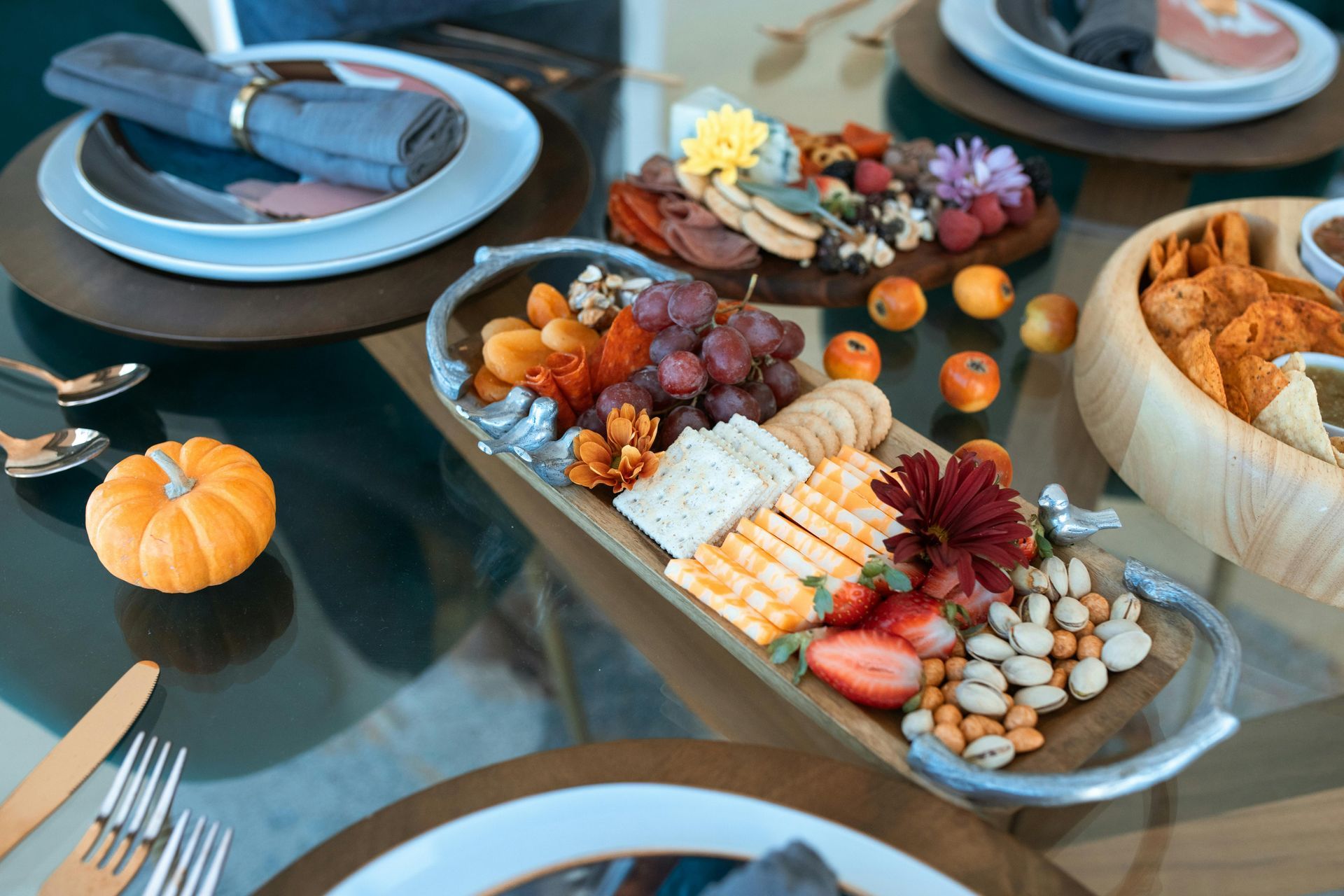
You may not realize you need one until you need one. We're talking a clear and concise cancellation policy and refund policy.
Running a charcuterie business, whether you specialize in grazing tables, charcuterie cups, or elegant boards for events like weddings, bridal showers, and baby showers, comes with its share of logistical challenges. One of the trickiest areas is navigating refund and cancellation policies. After all, cancellations are inevitable in the catering world, but how do you protect your business while maintaining great customer relationships?
Let's explore key elements of a solid cancellation and refund policy, the importance of upfront deposits, and how to prepare for those last-minute changes.
Why Is a Refund and Cancellation Policy Essential for Your Charcuterie Catering Biz?
Picture this: You’ve spent hours preparing for a stunning grazing table for a wedding reception. Everything from the artisanal cheeses to the fresh fruits is ready to go, and then—cancellation. The client decides to cancel just days before the event, leaving you with time and money spent, but no compensation.
This scenario is all too familiar for many catering professionals, and it’s why having a clear, written cancellation and refund policy is crucial. It protects your time, resources, and the effort you’ve invested in creating an exceptional product. But what exactly should you include in your policy?
What Should Your Cancellation Policy Cover?
Flexibility for Your Clients, Protection for Your Business
When writing your cancellation policy, ask yourself a few questions:
- What happens if a client cancels the week of the event?
- Will you offer a partial refund, full credit for future orders, or no refund at all?
- How will you handle emergencies?
- A family emergency or an event that is weather-dependent (like an outdoor wedding or baby shower) could cause last-minute changes. Will you make exceptions for these cases?
- Is your cancellation policy clearly stated?
- Is it listed on your website, in your contracts, and made known during booking? This prevents miscommunication and ensures that clients know exactly what to expect if they need to cancel.
A Sample Policy to Consider
Your policy might look something like this, but remember it's your business and you can write it however you want!
- Full refund or credit if the client cancels 5 days before the event.
- 50% refund or credit if canceled 3-4 days before.
- No refund for cancellations within 48 hours of the event, except for certain circumstances like family emergencies or weather-dependent cancellations.
By defining these terms, you help manage expectations and prevent last-minute surprises that could hurt your bottom line.
Do You Require Upfront Deposits?
Upfront deposits are common practice in the catering world, especially for custom orders like charcuterie grazing tables for weddings or corporate events. They offer a layer of protection for your business and help ensure client commitment.
Consider these questions when implementing deposits:
- How much should you charge for a deposit?
- Most caterers require a deposit of 30-50% of the total order cost upfront. This helps cover your initial costs, such as sourcing ingredients and preparing materials.
- When is the deposit due?
- Should deposits be paid at the time of booking, or do you give clients a window to finalize their payment?
- Are deposits refundable?
- It’s up to you whether to make deposits non-refundable. Many businesses choose to make deposits non-refundable unless the cancellation is within the early window of 5 or more days before the event. This ensures that you’re not left empty-handed for time already spent planning or purchasing ingredients.
Clearly stating your deposit terms not only secures your investment in the event but also ensures that clients understand the stakes.
What If Your Event is Weather-Dependent?
If you cater outdoor events like garden parties or wedding receptions, weather can be a major factor. Having a contingency plan in place can help mitigate losses if a client cancels or postpones due to bad weather.
Tips for Handling Weather-Related Cancellations
- Is the deposit transferable?
- If an event is rescheduled due to rain or snow, consider making the deposit transferable to the new date. This keeps clients satisfied without losing out on their booking.
- Will you require an additional fee for rescheduling?
- Some businesses may choose to charge a small rescheduling fee to cover the administrative and labor costs of adjusting plans for a new date.
- Do you have a policy for extreme weather?
- If a hurricane or snowstorm hits, will your clients get a refund or credit if they cancel within the last 48 hours?
Should Your Policy Be on Your Website or Contract?
Absolutely! The best way to ensure clients are aware of your cancellation and refund policies is to make them highly visible.
Also consider baking it into your invoice so that payment serves as acknowledgement of your cancellation and refund policy.
Displaying Your Policy
- Website: Dedicate a section of your website to your policies, particularly on any pages related to event bookings or pricing. Include a FAQ section where potential customers can find your terms easily.
- Contracts: If you use contracts for large orders like weddings or corporate events, always include your cancellation and refund policies in the contract. This serves as a written agreement, protecting both parties.
- Email Confirmation: After an order is placed, include a confirmation email that restates your policy, so there’s no ambiguity.
What Are Industry Norms for Refund and Cancellation Policies?

Best Practices from the Catering World
In the broader catering industry, refund policies often depend on the scale of the event and how far in advance the cancellation is made. For large events like weddings or corporate gatherings, it’s standard to offer only partial refunds if the cancellation occurs too close to the event. Why? Because many caterers, like charcuterie businesses, source perishable ingredients and put in prep work well before the day of the event.
Likewise, many caterers make deposits non-refundable, especially if they’re working with custom orders that are hard to repurpose. For example, a custom grazing table for a bridal shower that gets canceled last minute might result in hundreds of dollars in wasted food if no refund policy is in place.
Protecting Your Charcuterie Business
Establishing a firm, but fair, cancellation and refund policy protects your charcuterie business from the unexpected. Whether you’re crafting grazing tables for lavish weddings, charcuterie cups for corporate parties, or custom boards for intimate gatherings, having policies in place helps ensure that your hard work is compensated, even when plans change.
Take a moment to reflect on your current process:
• Do you have a clear cancellation policy?
• Is it easily accessible to your clients?
• Are you requiring deposits to secure bookings?
If not, now is the time to put those systems in place to help protect your charcuterie business and ensure long-term success.
By addressing these questions and crafting thoughtful policies, you can safeguard your business while providing excellent customer service. After all, running a successful charcuterie business isn’t just about the food—it’s about balancing your passion with smart business practices. Want to run your cancellation policy by someone? We're here to help -
elisa@charcuteriecity.com.
Charcuterie Calculator
Still trying to nail down your pricing? We can help! Check out our interactive Charcuterie Calculator that allows you to figure out your cost per serving.
Contact Us
The Rundown
Our Newsletter
We will get back to you as soon as possible.
Please try again later.
Subscribe For Our Newsletter
All Rights Reserved | Powered By Charcuterie Marketing Crew
